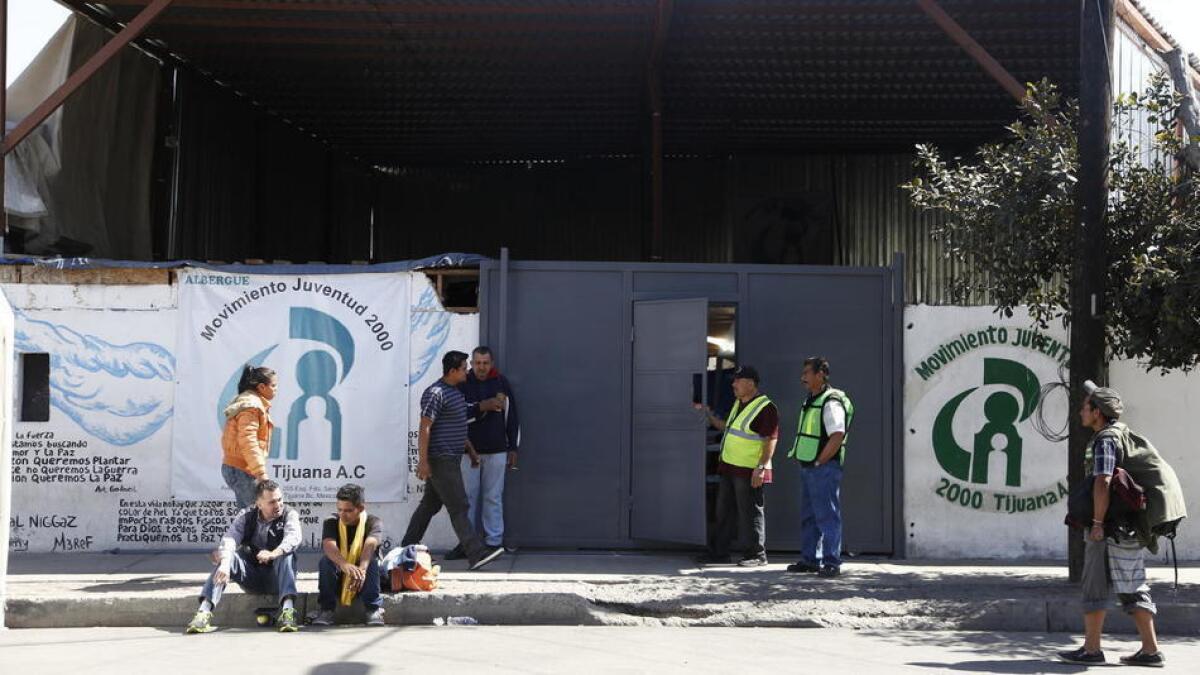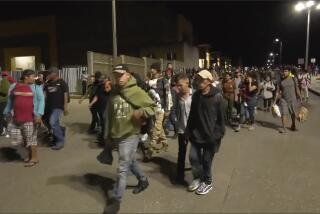People ‘associated with’ Central American caravan have entered U.S. illegally, federal officials say

Some people associated with the Central American migrant caravan, which arrived in Tijuana this week, have crossed into the United States illegally in the last 24 hours, federal officials said Saturday.
A pregnant woman and some children as young as 4 were detected entering the U.S. through a canyon that authorities described in a statement as dark, treacherous and “notorious for human and drug smuggling.”
They were said to have climbed over a dilapidated scrap metal border fence on either side of the San Ysidro Port of Entry.
The statement was issued Saturday afternoon by U.S. Customs and Border Protection.
No information was given on the number of people caught entering the U.S. illegally or what became of them.
It also was not clear if the statement’s phrase “people associated with” the caravan meant people who actually had taken part in the bus trek from Central America, through Mexico, to seek political asylum in the U.S.
Members of the caravan are expected to ask for asylum Sunday. Caravan members interested in requesting asylum spent Friday and Saturday at legal orientations to understand their rights and what to expect when they enter the U.S. port of entry.
“Individuals of the ‘caravan’ seeking asylum or other similar claims should seek protections in the first safe country they enter, including Mexico,” Chief Patrol Agent Rodney Scott said in the Customs and Border Protection statement.
“To anyone that is associated with this caravan, think before you act,” Scott continued. “If anyone has encouraged you to illegally enter the United States, or make any false statements to U.S. government officials, they are giving you bad advice and they are placing you and your family at risk.”
Pete Flores, the Customs and Border Protection director of field operations in San Diego, said in the statement that pedestrians at the San Ysidro Port of Entry will be divided into two lines — those with, and without, travel documents for legal entry.
If the facility becomes overcrowded with those who have no entry documents, they may need to wait in Mexico, Flores said.
“All travelers will be processed in accordance with appropriate detention and removal enforcement protocols,” he said.
While the odds of getting into the U.S. might be long, there are some Americans like Blair Overstreet and her husband Matt Dunn who said they would welcome some of those migrants who gained asylum into their homes in order to help them get a new start.
The idea of opening up their two-bedroom, one-bath apartment to a stranger just made sense to the San Diego couple — both 36 years old.
“It’s a humanitarian issue,” Dunn said.
It’s also political. The couple and others like them are taking a stand at a time when the nation seems starkly divided on who should be allowed to reside in United States and what it means to be American.
The Central American caravan is just the latest lightning rod issue in an increasingly divisive immigration debate. Even in progressive California, where state leaders approved sanctuary laws to protect people who are in the country without legal status, an anti-sanctuary movement quickly followed and appears to be gaining momentum.
“The willingness of these people to house these immigrants reflects that there is a division in the United States and in California over the appropriate course of immigration policy,” said Louis DeSipio, a professor of political science at UC Irvine.
The asylum seekers, who launched their journey weeks ago from southern Mexico toward the U.S., are scheduled to officially register their asylum claims Sunday in Tijuana.
The Central American caravan is just the latest line being drawn in the sand, said Heather Cronk, co-director of Showing Up for Racial Justice, a national anti-racism organization that is coordinating volunteer sponsors for those seeking political asylum.
An estimated 75 people have expressed interest in housing at least one asylum seeker, Cronk said. Some are from major metropolitan areas in California and New York. Others are from remote and rural areas in Montana and North Dakota.
“I think this is 100% about who we want to be as a nation,” she said. “Not only are we providing material support, supporting those who are in need of a place to go … We offer a counter message. We want to make very clear to the folks who are in the caravan and those across the country that Trump’s voice is not the only voice in this country. Where Trump closes doors, we open them.”
Though the caravan is relatively small compared to prior waves of immigration—some as most recent as the tens of thousands of Haitians who petitioned for asylum at the San Ysidro Port of Entry two years ago, the media attention on the caravan has been amplified by the Trump presidency.
“President Trump has sort of raised this group beyond probably the level they really merit in the broader scheme of things. It’s become symbolically important,” DeSipio said. “The caravan was on “Fox and Friends” and that got the president’s attention and that made it, in his mind, representative of a larger phenomenon. By talking about this particular group he was able to take on a bigger phenomenon. People are now traveling in groups for their safety but that somehow makes it seem more ominous.”
Migrants have the right to request asylum in the U.S. under immigration and international law, but Trump has angrily denounced the caravan, promising to stop them from entering the country. Department of Homeland Security officials and Atty. Gen. Jeff Sessions have used the caravan as a way to reaffirm their allegations that the asylum process is vulnerable to fraud.
“Individuals of the ‘caravan’ seeking asylum or other similar claims should seek protections in the first safe country they enter, including Mexico,” DHS Secretary Kirstjen Nielsen said.
pauline.repard@sduniontribune.com
Repard writes for the San Diego Union-Tribune.
UPDATES:
7:50 a.m.: This post was updated with stories of Americans interested in taking in migrants.
This post was originally published at 9:20 p.m. April 28.
More to Read
Start your day right
Sign up for Essential California for news, features and recommendations from the L.A. Times and beyond in your inbox six days a week.
You may occasionally receive promotional content from the Los Angeles Times.







